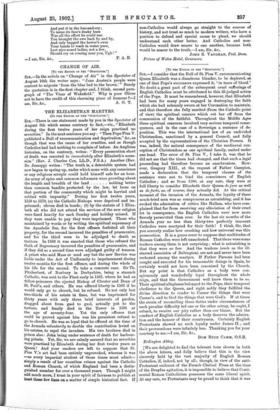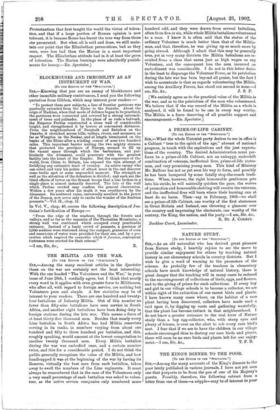[TO THE EDITOR OF THE "SPECTATOR. "] Sra,—I consider that the
Bull of St. Pius V, excommunicating Queen Elizabeth was a disastrous blunder, to be deplored, as one of that Pope's successors expressed it, "in tears of blood." No doubt a great part of the subsequent cruel sufferings of English Catholics must be attributed to this ill-judged action of the Pope. It must be remembered, however, that Elizabeth had been for many years engaged in destroying the faith which she had solemnly sworn at her Coronation to maintain, and that therefore she fully merited (from the Catholic point of view) the spiritual censure which cut her off from the communion of the faithful. Throughout the Middle Ages these spiritual censures involved very serious temporal conse- quences, and in the case of a Sovereign a sentence of de- position. This was the international law of an undivided Christendom, sanctioned by a general Council, and fully accepted by the representatives of the Christian Powers. It was, indeed, the natural consequence of the mediaeval con- ception of Christendom as one spiritual family, united under one head. The error of St. Pius V., I take it, was that he did not see that the times had changed, and that such a legal proceeding had therefore become an anachronism. How- ever, Gregory %III., at the request of Father Campion, made a declaration that the temporal clauses of the sentence were not to bind the consciences of English Catholics ; and so from 1580, at any rate, they were at full liberty to consider Elizabeth their Queen de jure as well as de facto, as, of course, they actually did. At the critical moment of the invasion of the Armada, the loyalty of these much-tried men was as conspicuous as astonishing, and it has evoked the admiration of critics like Hallam, who have com- plained that far from receiving any alleviation of their cruel lot in consequence, the English Catholics were now more fiercely persecuted than ever. In the last six months of the Armada year no less than thirty-two perfectly innocent Catholics were martyred for their faith ! I think, Sir, that you scarcely realise how crushing and how universal was this persecution. It is a grave error to suppose that multitudes of Roman Catholics were left unmolested. That there were some traitors among them is not surprising; what is astonishing is that they were so few. And the traitors (such as the ill- starred associates of Babington) are, not and never have been reckoned among the martyrs. If Father Parsons had been caught and executed for his treasonable doings in Spain, he certainly would not have been canonised by the Church. But my point is that Catholics as a body were con- spicuously and wonderfully loyal throughout the whole reign, and that the Government well knew them to be so. Their spiritual allegiance belonged to the Pope, their temporal obedience to the Queen, and right nobly they fulfilled the divine direction to render to Caesar the things that were Caesar's, and to God the things that were God's. If at times
the strain of reconciling these duties under circumstances of such peculiar difficulty led one or the other astray, he ought, I submit, to receive our pity rather than our blame. But the conduct of English Catholics as a body deserves the admira- tion and the honour of their countrymen. Certainly English Protestants showed no such loyalty under James II. ; and their provocations were infinitely less. Thanking you for your courtesy to me.—I am, Sir, &c.,
Dom BEDE CAHN, O.S.B.
Erdington Abbey.
[We are delighted to find the tolerant tone shown in both the above letters, and fully believe that this is the, view sincerely held by the vast majority of English Roman Catholics, if, indeed, not by all; though, in view of the anti- Protestant outburst of the French Clerical Press at the time of the Dreyfus agitation, it is impossible to believe that Conti- nental Roman Catholicism possesses the same liberal spirit. At any rate, we Protestants may be proud to think that it was Protestantism that first taught the world the virtue of tolera- tion, and that if a large portion of Roman opinion is now tolerant, it is because Rome has learnt the true way from those she persecuted. But when all is said and done, we still main- tain our point that the Elizabethan persecutions, bad as they were, were less bad than the Marian in a most important respect. The Elizabethan attitude had in it at least the germ of toleration. The Marian burnings were admittedly punish- ments for heresy.—En. Spectator.]
.•







































 Previous page
Previous page